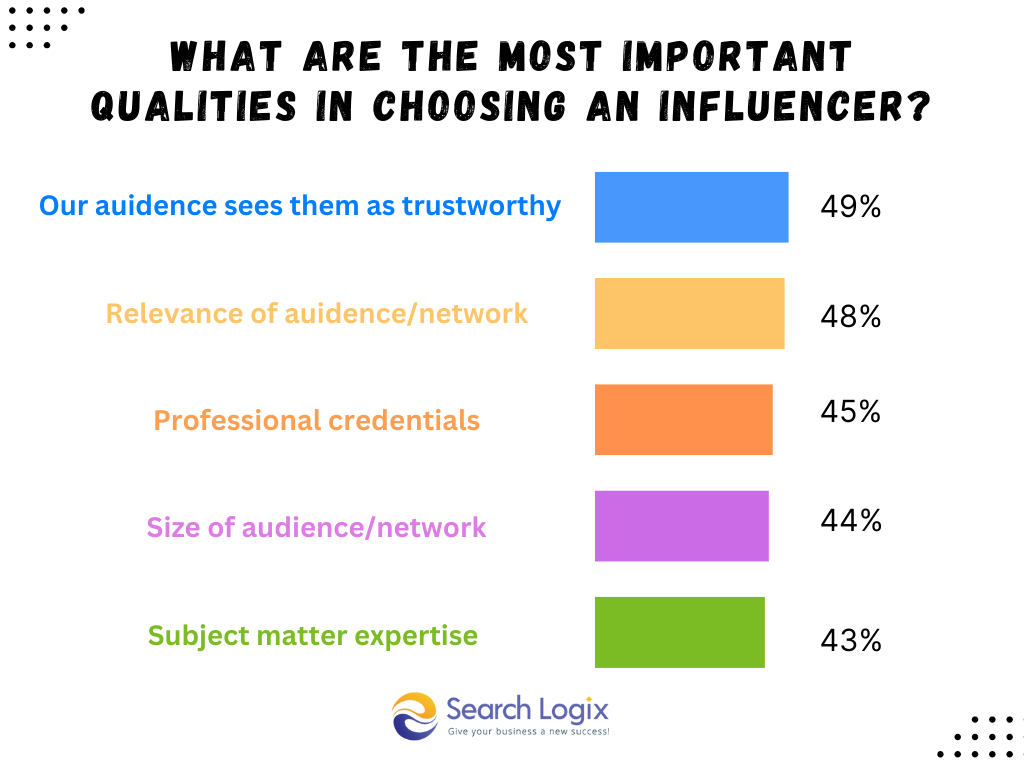How to Leverage B2B Influencer Marketing?
Table of Contents
Businesses spend a lot on marketing strategies, run paid ads, and do branding efforts for various purposes. Among all the activities they do, they also need to stick to the latest trends that can help them boost their efforts.
For the past decade, influencer marketing has paced up across the globe. The Internet is full of influencers, attaining a huge number of audiences as followers.
According to Ogilvy’s report, 73% of the companies are already leveraging B2B influencer marketing and 93% are planning to utilize it in the coming years.
In this guide, we will delve deeper to understand the concepts of B2B influencer marketing, its benefits and draw out some tactics to create a strategy.
What is B2B Influencer Marketing?
B2B influencer marketing is a process of strategically collaborating with industry experts and thought leaders to amplify your brand’s message. These individuals are the influencers who have a large target market and people follow them to make a buy decision.
By partnering with these individuals, businesses can attain their target audiences meanwhile harnessing their credibility to drive business growth. In simple words, people trust recommendations from peers. This holds in the B2B sphere as well.
Successful B2B influencer marketing often involves a blend of social media and content marketing. In today’s content-driven landscape, creating engaging content is essential to connect with your target influencers effectively.
While B2B influencer marketing shares similarities with its B2C counterpart, it requires a unique approach. Identifying and collaborating with individuals who possess deep industry knowledge is crucial.
These influencers have the power to sway corporate decision-makers and participate in high-level business conversations. By forging strong partnerships with these experts, you can position your brand as a trusted solution provider.
Why is B2B Influencer Marketing Important for Brands?
To stand out in today’s competitive B2B landscape, your brand must build trust, create a memorable impression, foster strong relationships, and deliver exceptional value.
Influencer marketing offers a potent solution by leveraging the time-tested power of word-of-mouth recommendations, specifically from industry experts.

Here are the top reasons why you should go with B2B influencer marketing:
1. To expand the reach and build trust
By partnering with influential figures in your industry, you can tap into their established audience, introducing your brand to new potential customers. Research indicates that B2B buyers place significantly more value on third-party endorsements, making influencers invaluable assets.
Influencers have earned their followers’ trust through consistent expertise and authentic engagement. When they endorse your brand, they lend their credibility to your offerings, fostering trust among their audience and ultimately driving brand loyalty.
2. To generate potential leads and conversions
Influencer partnerships can directly impact your sales pipeline by generating high-quality leads. By collaborating with influencers whose audience aligns with your ideal customer profile, you can attract qualified prospects who are more likely to convert into customers.
Influencers can also help nurture leads by providing valuable insights and recommendations, guiding potential customers toward a purchase decision.
3. To boost engagement and visibility
Influencer collaborations can supercharge your content’s visibility and engagement. Social media algorithms favor content with high engagement rates, and influencer partnerships can significantly boost these metrics.

By leveraging an influencer’s established following, you can increase your content’s reach and visibility, positioning your brand as a thought leader in the industry.
Ultimately, B2B influencer marketing is about building strong relationships with industry experts who can amplify your brand’s message, drive trust, and expand your reach.
Types of Influencers for B2B Marketing
Identifying the right influencers is crucial for a successful B2B marketing campaign. Here are the primary types of influencers to consider:
1. Industry Experts
Industry experts are seasoned professionals with deep knowledge and experience in a specific industry. They are often seen as thought leaders and have cultivated a strong reputation among their peers. Partnering with industry experts can lend your brand unparalleled credibility and authority.
2. Content Creators
Content creators excel at producing high-quality, informative, and engaging content. They may run popular blogs, host webinars, or create video content. Collaborating with content creators can help you reach a wider audience and establish your brand as a valuable resource in the industry.
3. Social Media Influencers
Social media influencers have a significant following on platforms like LinkedIn, Twitter, and Instagram. They can help you increase brand visibility, generate leads, and foster community engagement. By partnering with social media influencers, you can tap into their existing audience and expand your reach.
4. Customer Advocates
Customer advocates are your most enthusiastic customers who are passionate about your brand. They can be incredibly influential in recommending your products or services to their networks. By leveraging their positive experiences, you can generate authentic testimonials and build trust with potential customers.
Understanding these influencer types will help you identify the best partners for your B2B marketing campaign and maximize your ROI.
How to Create a B2B Influencer Marketing Strategy?
Developing a robust B2B influencer marketing strategy requires meticulous planning and execution. Here’s a step-by-step guide to help you navigate the process:
1. Establish Clear and Measurable Objectives
Before you start with your campaign, it’s essential to know some basics for your B2B influencer marketing. You need to know your target market as well as your business objectives as well. Here are the steps to prepare for these challenges:
- Align with overall business objectives: Ensure your influencer marketing goals are directly tied to your company’s broader strategic aims.
- Set SMART goals: Ensure goals are Specific, Measurable, Achievable, Relevant, and Time-bound.
- Prioritize key metrics: Determine the most important metrics to track, such as lead generation, website traffic, engagement rate, or return on investment (ROI).
Whether it’s amplifying brand awareness among C-suite executives, generating high-quality leads within a specific industry segment, or boosting product adoption rates, crystallize your desired outcomes. By establishing clear KPIs, you can effectively measure campaign performance and make data-driven adjustments.
2. Conduct In-Depth Target Audience Research
Understanding your audience is one of the most crucial steps in B2B influencer marketing. You need to analyze their behavior and response towards different businesses in the market.

Here are the crucial steps you should utilize:
- Create detailed buyer personas: Develop comprehensive profiles of your ideal customers, including demographics, firmographics, challenges, and goals.
- Identify influencer sweet spots: Determine the specific niches and sub-industries within your target market that align with potential influencer audiences.
- Understand audience behavior: Analyze how your target audience consumes content, which platforms they use, and the type of content they engage with.
This granular knowledge will enable you to identify influencers whose audience aligns seamlessly with your ideal customer profile.
3. Find Reliable and Business-oriented Influencers
As per your target market, you need to find the most reliable individuals who can understand your business, its products or services, and its core objectives. To do so, you need to follow these steps:
- Leverage influencer marketing platforms: Utilize tools like Upfluence, Klear, or Traackr to discover influencers in your industry.
- Conduct social media searches: Identify influencers based on relevant keywords, hashtags, and industry-specific groups.
- Analyze influencer metrics: Evaluate influencers based on engagement rates, audience demographics, and content quality.
Develop a realistic timeline that allows for ample time for relationship building, content creation, and campaign execution.
4. Identify and Cultivate High-Impact Influencer Partnerships
Partnering with B2B influencers requires aligning your expectations with their methods of promoting businesses. You should understand their way of approaching audiences while making sure they are suitable for your brand.
- Engage with influencers consistently: Interact with influencers on social media, comment on their content, and share their work.
- Offer value: Provide insights, resources, or exclusive access to demonstrate your value as a partner.
- Create personalized outreach: Tailor your outreach messages to each influencer, highlighting their specific expertise and how a partnership can benefit them.
Collaborating with influencers is an entertaining journey as they always come up with exciting and unique ideas for marketing and brand promotions.
5. Developing Compelling and Aligned Content
Content creation is the backbone of B2B influencer marketing for brands. You need to brainstorm ideas to promote your products or services and attract potential audiences.

Here are some useful ways to do it:
- Interact closely with influencers: Work together to develop content ideas that resonate with the target audience.
- Leverage influencer skills and expertise: Allow influencers to share their insights and knowledge in the content.
- Create various content formats: Explore different content formats such as blog posts, webinars, podcasts, videos, or social media campaigns.
Just make sure that the content aligns seamlessly with your brand’s messaging and tone of voice.
6. Amplify Multi-Channel Distribution
Maximize the impact of your influencer collaborations by distributing content across multiple channels.
- Leverage influencer channels: Encourage influencers to share content with their audience.
- Amplify reach through owned channels: Utilize your company’s website, blog, email marketing, and social media platforms.
- Explore paid advertising: Consider paid promotion to increase content visibility and reach a wider audience.
Encourage influencers to share the content with their audience, thereby expanding your campaign’s influence.
7. Measure, Analyze, and Optimize
Analysis of your B2B influencer marketing strategy is crucial, as you need to know about the progress of your efforts.
- Implement robust tracking: Use analytics tools to monitor key performance indicators (KPIs) and measure campaign success.
- Analyze campaign performance: Identify which influencers and content formats drive the best results.
- Iterate and improve: Continuously refine your strategy based on data insights and industry trends.
Analyze data to identify trends, calculate ROI, and gain insights into audience behavior. Use these insights to refine your strategy and optimize future campaigns.
Top Brands Became Successful with B2B Influencer Marketing
Influencer marketing has undeniably transformed the B2B landscape. To illustrate its power, let’s examine some successful campaigns.
1- Microsoft and National Geographic: A STEM-Focused Collaboration
Microsoft’s partnership with National Geographic is a prime example of how B2B brands can leverage influencer marketing for social impact. By featuring National Geographic explorer Jenny Adler, the ‘Make What’s Next’ campaign inspired young girls to pursue STEM careers. This collaboration not only elevated Microsoft’s brand image but also demonstrated its commitment to corporate social responsibility.
2- American Express: Empowering Small Businesses
American Express showcased the versatility of influencer marketing by partnering with a design blogger and a lifestyle presenter. This dual-pronged approach effectively targeted small business owners, highlighting the benefits of accepting American Express cards. The campaign’s focus on practical tips and visual storytelling resulted in significant social media engagement.
3- Shopify: Leveraging YouTube for B2B Success
Gartner’s findings underscore the importance of video platforms in B2B decision-making. Shopify capitalized on this trend by partnering with popular YouTuber Ali Abdaal. By showcasing the platform’s benefits through a trusted influencer, Shopify effectively reached a tech-savvy audience and demonstrated the platform’s value for growing businesses.
Deploy Our Influencer Marketing Strategies for Your B2B Brand?
In today’s complex B2B landscape, influencer marketing has emerged as a potent strategy to build brand awareness, generate leads, and foster trust. By carefully selecting influencers, crafting compelling content, and measuring campaign performance, businesses can effectively leverage the power of industry experts to drive growth.
Navigating the intricacies of B2B influencer marketing can be challenging. This is where eSearch Logix comes in. As a leading B2B marketing agency, we specialize in developing and executing successful influencer marketing campaigns. Our expertise includes:
- Comprehensive influencer identification and selection: We leverage advanced data analytics to find the perfect influencers for your brand.
- Strategic partnership development: We build strong relationships with influencers to ensure successful collaborations.
- Content creation and optimization: Our team creates compelling content that resonates with your target audience.
- Campaign management and optimization: We track key performance indicators and make data-driven adjustments to maximize ROI.
Let eSearch Logix be your partner in unlocking the full potential of influencer marketing. Contact us today to learn how we can help your business thrive.







